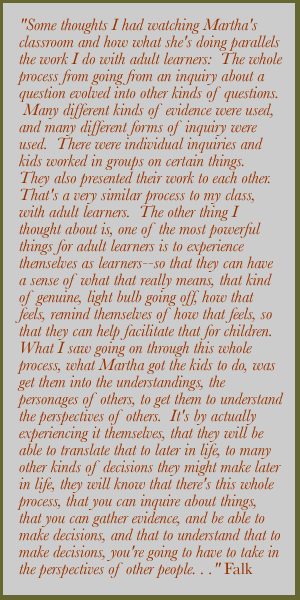 |
![]()
Throughout this project, Andrews and Falk talked about a number of issues including the culture of the school and classroom, the role of assessment in planning, and the process of inquiry and reflection. This page includes Falk's overall reflections on the class and its relevance for a course for preservice teachers she teaches at City College. From Andrews: How do you feel, looking back on the unit? Were your goals met? What did you learn while teaching this unit? What advice do you have for other teachers? What are some of the distinguishing features of Martha's practice? |
 |
• This study, as well as others in the school, features active learning experiences such as projects, dramatic play (for example, in the Colonial America study, students each assume the role of a townsperson), trips, cooking and other engaging activities. • Teaching is informed by a "cycle of inquiry." Martha continually assesses students' actions and work to ascertain what they know and understand, what misconceptions they may have, what skills they have acquired, and what skills they need. The information gained from this inquiry is used to shape the curriculum and inform her instruction. The original curriculum plan is thus considered a draft. The curriculum evolves based on the teacher's exploration of students' needs, questions, and interests, her reflection and analysis, leading to adjustments to the original plan. |
|
• Martha really needs to know the content of her study well to make beginning plans, design interesting activities for it, and respond to the children's emerging questions. However, she does not need to have all the answers. Once the study is in process, she becomes a co-investigator with the students. She functions as a facilitator whose goal is to get the students to learn how to acquire information, view it from a variety of perspectives, answer questions, and weigh evidence to make judgments and form their own opinions, and then generate still other questions. • A sense of community is established in the classroom through opportunities for shared responsibilities, group work, working in pairs, and whole-class meetings in which ideas are shared. These create a feeling of trust, safety, and camaraderie, all of which make learning easier for the students. • The knowledge students gain through the study is made public through presentations to each other, their families, and others in the school. |
|